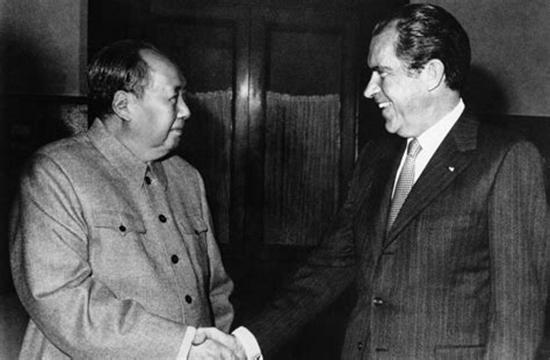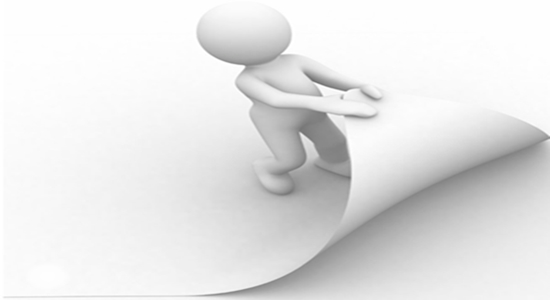
In 1972, when Ayn Rand wrote about President Nixon’s trip that year to China, she didn’t know about the private notes and memos and behind-the-scenes machinations that would later come to light, including the conscious early decision of the Nixon administration to toss Taiwan to the wolves. But she could see that Nixon, “no giant,” was achieving no masterly diplomatic coup.
Her article “The Shanghai Gesture” appeared in three parts in three successive issues of The Ayn Rand Letter (in March and April 1972) and, so far as I know, has never been reprinted. It should be, though, especially in light of what the appeasement of China then and since, by America and the rest of the world, has wrought.
One or two details of the analysis seem out of date today. But Rand understood that the U.S.—and Taiwan—were the losers in the smiley and dishonest rapprochement.
It is America that all the enslaved peoples of the world look up to as the symbol of freedom and as their last hope. For the Chinese to see an American President drinking toasts to their jailers is so cruel a blow that, in the name of humanity, no one should ever permit himself to deliver it….
Both the American and the Chinese officials recited declarations to the effect that they have political “differences” (which were left unnamed), but that they would set the differences aside and confine themselves to a quest for things they have in common. Nevertheless, the Chinese invited Mr. Nixon to attend the performance of a revolutionary ballet—in which a pajamas-clad ballerina, representing a girl-guerrilla, jerked acrobatically across the stage, through a jerking corps de ballet in proletarian costumes, seeking a way to fight her enemy (the capitalist system), and ended up brandishing a huge wooden rifle. Via satellite-relayed television, the world saw an American President applauding this.
If the roles were reversed, and the Chinese officials, visiting Washington, were invited to attend an opera based, say, on The Manchurian Candidate, would anyone take it as an expression of our respect for them? I do not believe that they would attend. But they knew, I guess, what they were doing in Peking, and what type of man they were dealing with, because it was Mr. Nixon who, in parting, chose to quote from a revolutionary poem by Mao Tse-tung. Chou En-Lai did not quote from the Declaration of Independence.
Rand’s observations about the joint communiqué issued on the occasion have also survived the decades.
By contrast, observe the firmness, the decisiveness, the morally confident tone of the Chinese section of the Communiqué—and consider the nature of the strength which a philosophy (i.e., a set of fundamental principles integrating one’s view of life) gives men in practical action (even when it is one of the most vicious philosophies on record).
The Chinese section begins by declaring: “Wherever there is oppression, there is resistance. Countries want independence, nations want liberation and the people want revolution—this has become the irresistible trend of history.”
This is a miniature manifesto, taking an uncompromising position on a fundamental issue and proclaiming the doom of the United States. The position is false, but it acquires, in this context, the persuasive power of truth, because there is nothing in the U.S. statement to contradict it.
It is generally known that by the word “oppression” the communists mean economic freedom—and by the word “liberation,” a totalitarian dictatorship. Did anything in the U.S. section claim otherwise?
On Taiwan:
What is a “peaceful” settlement between an armed, bloodthirsty, totalitarian State of 800 million people and a tiny sanctuary of 14 million people, including a 2 million minority of refugees from the mainland?…
The United States has a treaty to protect Taiwan…. But while the Chinese permit themselves to dictate the foreign policy of the U.S.—by declaring what the U.S. forces “must” do (regardless of obligations)—the U.S. side carefully fails to mention the treaty. And more: the U.S. side bends backward to assure the Chinese that its “ultimate objective” is to obey them and withdraw all its forces from Taiwan (an “objective” never announced before). The slender reservation of setting no date for the withdrawal is undercut by the promise that our forces, “in the meantime,” will be progressively reduced “as the tension in the area diminishes.”
In what area? Whose tension? How is “tension” to be gauged—and by whom? Under what tension does this now place the people on Taiwan? How would you like to live with the threat of a massacre hanging over you by such a contemptibly precarious semantic thread?
If Taiwan has managed to survive as an independent country in the decades since, it’s not thanks to Nixon and Kissinger or the lead that the United States gave other countries to follow.
Also see:
StopTheChinazis.org: Videos: “Keep Taiwan Free!” and “Why Should Americans Defend Taiwan?”
While visiting Taiwan around the time of the January 2024 elections, Paul Jacob shared his thoughts about the country’s past and prospects.
StopTheChinazis.org: “Nixon’s Shanghai Gesture”
TaiwanDocuments.org: “Joint Communique of the United States of America and the People’s Republic of China,” February 28, 1972





